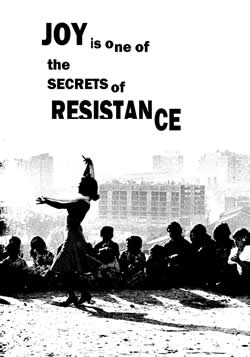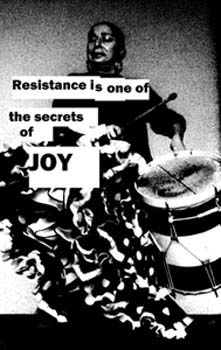radical ecology
There is now one dominant global culture, an ever expansionist and predatory industrial capitalism, valuing profit above life. It is a system which reduces the entire natural world – mountains, forests, oceans; plants and animal species (including human beings) – into resources to be ordered and controlled, used and exploited in the pursuit of material growth and economic development – this ever more suffocating technocratic system, is destroying the ecology of life.
 Radical ecology points out that solutions to a crisis of this scale involve far more than technological fixes or market incentives: How can there be technological solutions while the ‘drive to mastery’ at the core of technological development remains unchallenged? How can there be market based or consumer driven solutions unless we realise that an economic system that regards the natural world as so many resources to be bought, sold, and commodified is deeply irreconcilable with a truly ecological sensibility? How can we hope that legislation and regulation will be adequate while our political systems continue to support the disempowerment of the majority of humankind, and drift inexorably towards lifeboat authoritarianism?
Radical ecology points out that solutions to a crisis of this scale involve far more than technological fixes or market incentives: How can there be technological solutions while the ‘drive to mastery’ at the core of technological development remains unchallenged? How can there be market based or consumer driven solutions unless we realise that an economic system that regards the natural world as so many resources to be bought, sold, and commodified is deeply irreconcilable with a truly ecological sensibility? How can we hope that legislation and regulation will be adequate while our political systems continue to support the disempowerment of the majority of humankind, and drift inexorably towards lifeboat authoritarianism?
Embracing both deep ecology and social ecology, radical ecology seeks to champion a sustainable and socially just world through the transformation of the conditioning factors which exist both within our individual consciousness and which are inscribed in our social-economic, political-judicial and technological systems, in a way that highly determines our lives.
The term Deep Ecology was first coined in 1972 by Norwegian philosopher Arne Naess. He used the term to point out a distinction between a “shallow” anthropocentric and technocratic environmental movement concerned primarily with pollution, resource depletion, and the “health and affluence of people in the developed countries”, and a “Deep, Long-Range Ecology movement”.
 In this view, shallow environmentalism is human-centred. It views humans as somehow above our outside of nature, the pinnacle of evolution, as the source of all value, and ascribes only instrumental or 'use' value to nature which humans are variously entitled to dominate, control or (in slightly softer terms) steward. In this way it perpetuates many of the fundamental world views which have fuelled our collision course with ecological disaster.
In this view, shallow environmentalism is human-centred. It views humans as somehow above our outside of nature, the pinnacle of evolution, as the source of all value, and ascribes only instrumental or 'use' value to nature which humans are variously entitled to dominate, control or (in slightly softer terms) steward. In this way it perpetuates many of the fundamental world views which have fuelled our collision course with ecological disaster.
In contrast deep ecology offers a fundamentally different sensibility. It does not separate humans from the natural environment. Neither does it see the world as a collection of isolated objects (as much of western Cartesian and mechanistic science has assumed) but as a network of phenomena that are fundamentally interconnected and interdependent (as the new systems theory growing out of the life sciences suggests). Deep ecology recognizes the intrinsic value of all living beings and views humans as just one particular strand in the web of life.
Ultimately, deep ecological awareness implies a spiritual or religious awareness. It encourages a shift in consciousness from an alienating sense of seperateness to one of belonging, of connectedness, to the natural ecosystems on which we depend and even to cosmos as a whole. The new vision of reality which emerges with a deep ecological awareness is largely consistent with the so-called 'perennial philosophy' of spiritual traditions. It has found affiliation amongst the spirituality inspired by Christian mystics, Buddhists, the pagan and Wicca inspired practices of the Reclaiming tradition, and is found to be consonant with the philosophy and cosmology underlying the worldviews of many indigenous peoples.
Deep ecology asks ever deeper questions about the very foundations of our modern, scientific, industrial, growth-oriented, materialistic worldview and way of life. It challenges this paradigm from an ecological perspective: from the perspective of our profound interconnectedness with one another, with future generations, and to the web of life.
 Although deep ecology has provided a valuable philosophical and spiritual basis for the emergence of an ecological consciousness, and a revealing critique of the anthropocentric paradigms of our current civilisation, it has sometimes failed to offer much by way of political critique. At times proponents of deep ecology have tended to indiscriminately lump humanity together into an undifferentiated anti-ecological entity, sometimes even falling into misanthropy. Deep ecologists have often failed to recognise how, what Raine Eisler has called, the 'dominator system' of social organisation has been at core of the ecologically destructive socio-economic systems of our time. The apparent lack of a political critique and understanding of the role of socio-economic systems in ecological destruction led to a variety of criticisms from social ecologists. Many of those criticisms have been welcomed and have contributed to a deeper understanding of the systems at play amongst deep ecologists.
Although deep ecology has provided a valuable philosophical and spiritual basis for the emergence of an ecological consciousness, and a revealing critique of the anthropocentric paradigms of our current civilisation, it has sometimes failed to offer much by way of political critique. At times proponents of deep ecology have tended to indiscriminately lump humanity together into an undifferentiated anti-ecological entity, sometimes even falling into misanthropy. Deep ecologists have often failed to recognise how, what Raine Eisler has called, the 'dominator system' of social organisation has been at core of the ecologically destructive socio-economic systems of our time. The apparent lack of a political critique and understanding of the role of socio-economic systems in ecological destruction led to a variety of criticisms from social ecologists. Many of those criticisms have been welcomed and have contributed to a deeper understanding of the systems at play amongst deep ecologists.
Social ecology augments deep ecology with it’s analysis of the way in which patterns of social organisation such as patriarchy, capitalism and imperialism are central to the current ecological crisis. Social ecologists and ecofeminists have pointed out how the exploitation of nature has gone hand in hand with the exploitation of other humans in various hierarchical, militaristic, capitalist and industrialist forms. They point out that social transformation does not simply lead from a change of consciousness, but also requires radical restructuring of the socio-economic system. The work of many social ecologists like Murrray Bookchin, Francis Moore Lappé, J. Baird Callicott, along with contributions from George Bradford, Ariel Kay Salleh, Janet Biehl, and Carolyn Merchant have offered a valuable critique and corrective to deep ecology’s limitations in this respect.
 Deep ecologists have in turn made counter arguments. And an ongoing debate continues between deep and social ecologists which has created a fertile and valuable range of analysis from which many radical ecologists draw insights and inspiration. Marrying a political critique with a recognition of the psychological and spiritual dimensions of our condition, radical ecology has grown into a diverse and creative movement.
Deep ecologists have in turn made counter arguments. And an ongoing debate continues between deep and social ecologists which has created a fertile and valuable range of analysis from which many radical ecologists draw insights and inspiration. Marrying a political critique with a recognition of the psychological and spiritual dimensions of our condition, radical ecology has grown into a diverse and creative movement.
Radical ecology is not a monolithic movement, nor does it suggest a fixed ideological position. Radical ecology is a critical encounter, a working out through thought and praxis, of how we can really envision, embody and realise both methods to resist the destructive march of the industrial growth socio-economic system and effect the changes necessary for a new way of living in full partnership with the rest of the natural world. It includes work and experiments in non-hierarchical social forms, new economics, process oriented science, and a revitalised spirituality. Its visionary nature inspires many people forming the anti-globalisation movement and practitioners of direct action, as well as many working in mainstream political fields, ecological conservation, the organic agriculture and permaculture movements and many fighting for the rights of indigenous people.
For more see:
Harbringer Journal of Social Ecology
The Institute of Social Ecology
Earth First! Journal
Deep Ecology Foundation
